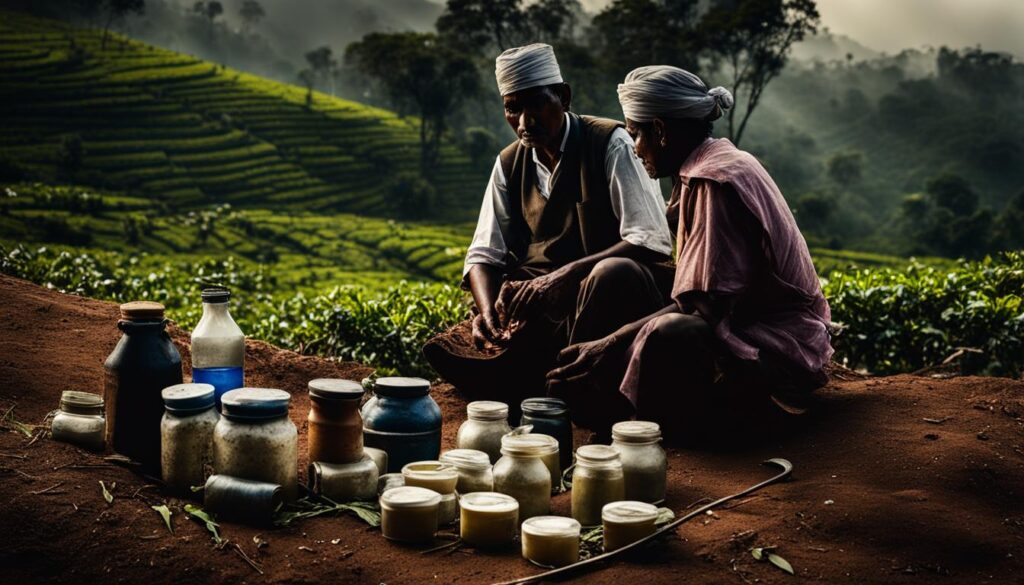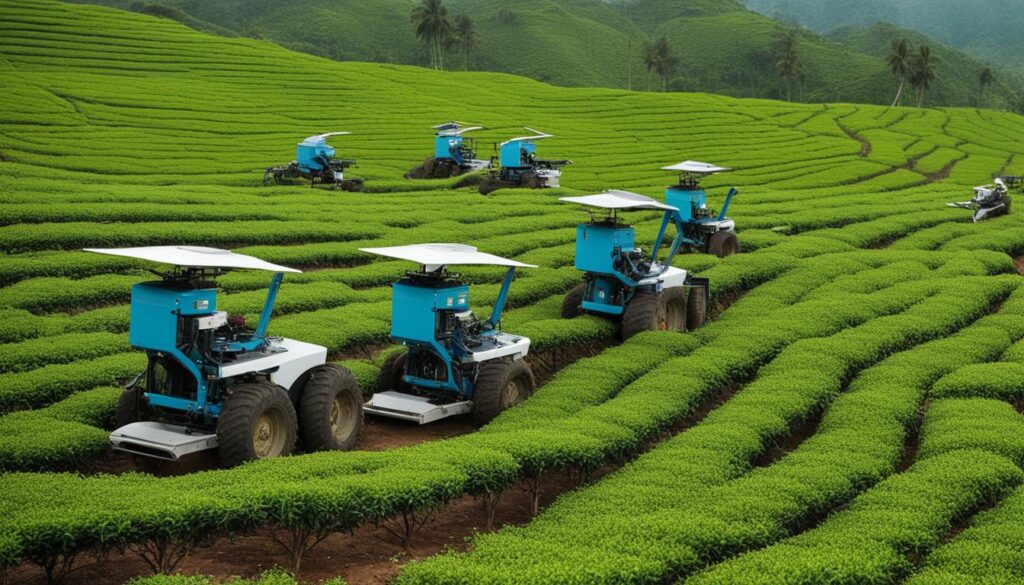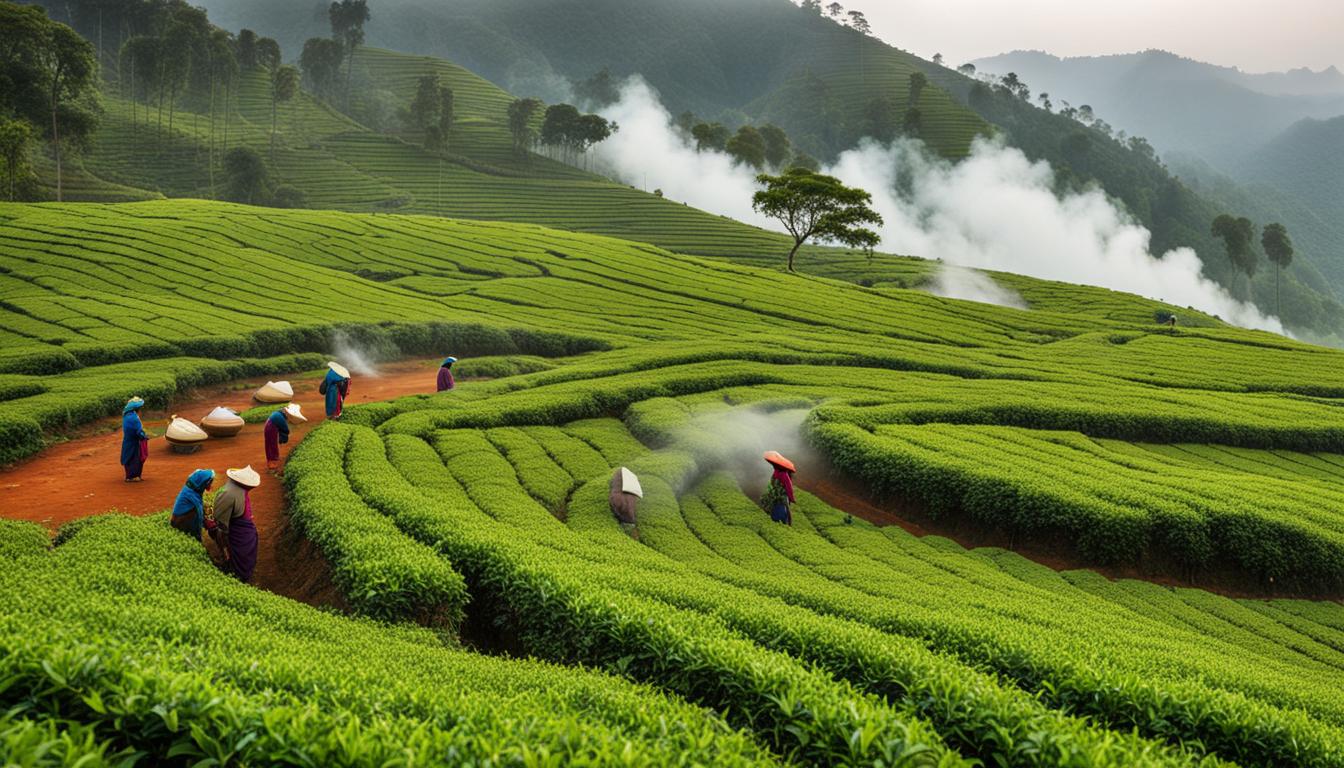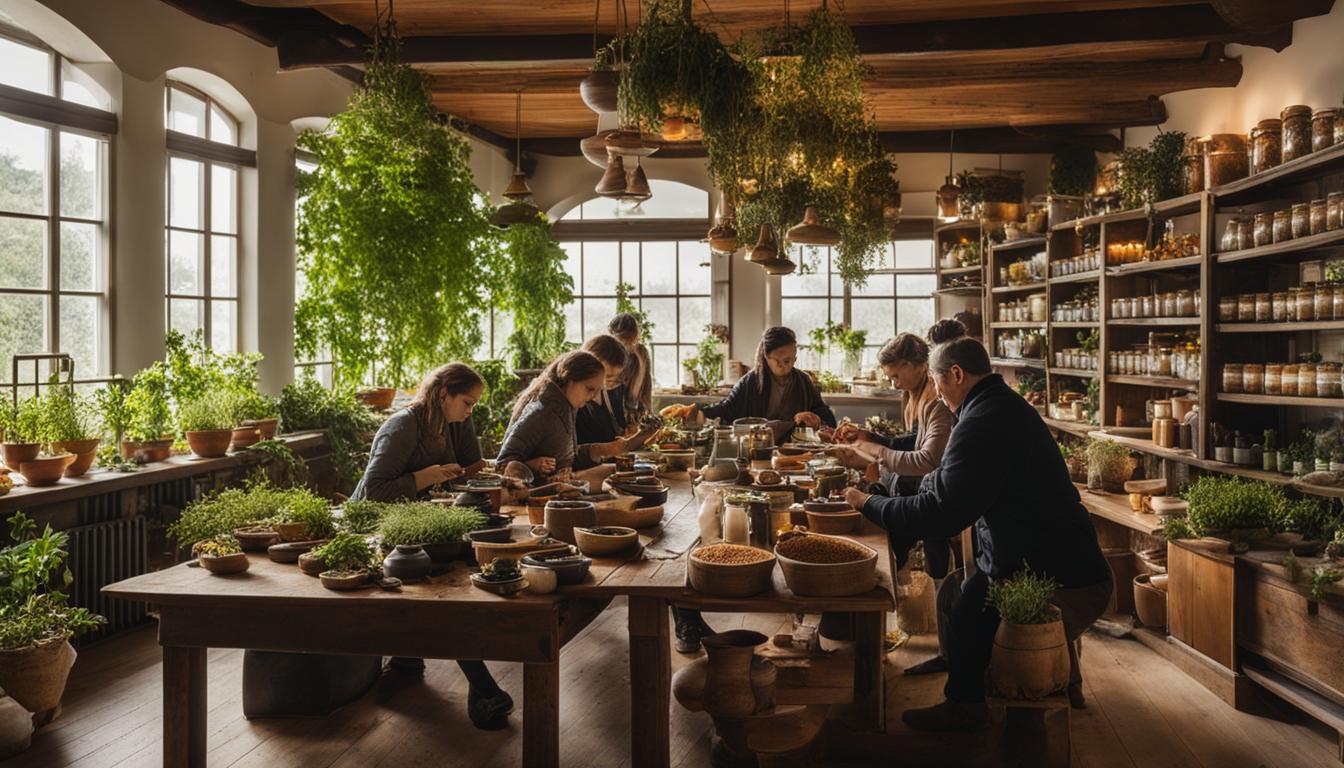Welcome to our latest article series, “Behind the Brew: Stories from Tea Estates,” where we delve into the untold tales of tea garden history, lore, and cultural narratives. Join us as we uncover the fascinating world behind your favorite cup of tea and shed light on the stories that often go unnoticed.
Tea estate workers play a vital role in the tea industry, yet their experiences are often overlooked. In this series, we aim to bring their voices to the forefront, highlighting both the challenges they face and the rich heritage they contribute to.
From the lush tea gardens of North Bengal to the remote estates in West Bengal, we’ll explore the realities of life on a tea farm and the struggles faced by these hardworking individuals. Get ready to discover the darker side of tea plantations, as well as the potential for tea tourism to transform the lives of tea estate workers and preserve centuries-old traditions.
Key Takeaways:
- Tea estate workers in North Bengal often face exploitation and inadequate access to healthcare.
- Many tea companies have closed down, leaving workers jobless and at the mercy of illegal estate operators.
- Poor working conditions and low wages contribute to malnutrition and serious health issues among tea garden workers.
- Tea tourism in India offers a unique opportunity to explore the history, culture, and natural beauty of tea-growing regions.
- Supporting tea tourism can contribute to the well-being of tea estate workers and the preservation of traditional tea plantation practices.
Exploitation and Inadequate Healthcare in Tea Estates
Tea garden workers in North Bengal, particularly in the Doars region, are not only victims of exploitation but also lack access to essential healthcare services. These workers, who are the backbone of the tea industry, often earn meager wages, with some receiving as little as Rs 100 per day. The closure of tea companies has resulted in thousands of job losses, forcing many workers to seek employment in closed estates, which operate illegally. As a result, these workers face dire conditions, including malnutrition and serious illnesses due to the absence of proper healthcare facilities.
The situation worsens for workers in closed tea estates, where abandoned hospitals stand as grim reminders of the inadequate healthcare available in tea gardens. The absence of healthcare exacerbates their already precarious circumstances, leaving them vulnerable to various ailments such as tuberculosis and malnutrition. Sadly, the lack of proper medical attention perpetuates a cycle of poor health and reduced quality of life among tea estate workers.
This alarming state of affairs is indicative of the exploitative tales witnessed in many tea estates across the region. The combination of low wages, lack of job security, and inadequate access to healthcare creates a challenging environment for these hardworking individuals. Urgent measures are needed to address the systemic issues and ensure the well-being of tea garden workers by providing them with fair wages and comprehensive healthcare services.
“The exploitation and lack of healthcare in tea estates not only harm the workers but also impact the overall sustainability of the tea industry. It is crucial for tea companies, government bodies, and society as a whole to come together and address these issues effectively.”

The Impact of Exploitation on Tea Garden Workers
The exploitation experienced by tea garden workers has far-reaching consequences on their overall well-being. The combination of low wages and lack of access to proper healthcare leaves them vulnerable to physical and mental health issues. Moreover, the closure of tea companies and the resulting job losses deepen the economic hardships faced by these workers, pushing them further into poverty.
Tales from Tea Estate Workers: Life on a Tea Farm
Tea estate workers like Bikram Tanti from the Dheklapara tea estate in West Bengal have shared their experiences, providing insight into the challenging realities they face in their daily lives. These workers endure dilapidated living conditions, often residing in abandoned hospitals on the tea farms. With meager wages, they struggle to make ends meet, further exacerbated by the lack of access to healthcare and nutritious food.
The plight of tea estate workers goes beyond financial hardship. The absence of basic healthcare facilities leads to poor health and malnutrition among the workers. Unfortunately, those employed in closed estates suffer even more, earning lower wages and being denied statutory benefits. The irregularity of work and limited livelihood options further worsen their already difficult circumstances.
These personal accounts from tea estate workers unveil a harsh reality that demands attention and action. It is crucial to address the exploitative conditions and provide support for these workers, ensuring they have access to fair wages, healthcare, and improved living conditions.
Insights from Tea Estate Workers
“Living and working on a tea farm is a constant struggle. We face challenges every day, from the lack of proper housing to inadequate wages. It’s a difficult life, and many of us suffer from health issues due to the absence of healthcare facilities. We need better conditions and support to improve our livelihoods.” – Bikram Tanti, Tea Estate Worker
Table: Comparison of Tea Estate Working Conditions
| Aspect | Regular Tea Estates | Closed Tea Estates |
|---|---|---|
| Wages | Low, but generally above minimum wage | Even lower, often below minimum wage |
| Statutory Benefits | Available | Denied |
| Living Conditions | Poor, but some basic amenities | Dilapidated, often residing in abandoned hospitals |
| Healthcare | Limited access to healthcare facilities | Minimal or no access to healthcare facilities |
The Dark Side of Tea Plantations
The tea industry, often romanticized for its beauty and cultural significance, has a dark side that goes unnoticed by many. Exploitation runs rampant in tea plantations, where workers endure harsh conditions and labor under low wages. Forced labor and inadequate healthcare facilities further compound the plight of these workers, highlighting the pressing need for reform in the industry.
Tea plantation workers face various forms of exploitation, with many earning wages below the fixed daily rate. This economic disparity results in significant hardships, as workers struggle to make ends meet and provide for their families. In addition to the low wages, tea companies closing down have left thousands of workers unemployed, making them vulnerable to exploitation by local groups who take over the estates illegally.
“Tea plantation workers are often paid less than the fixed daily wage and are denied essential benefits. They face inadequate healthcare facilities and suffer from malnutrition and serious ailments.”
The lack of access to healthcare is particularly alarming in tea plantations, where workers are exposed to hazardous working conditions and physical strain. Without appropriate healthcare facilities, these workers are left to cope with malnutrition and debilitating illnesses on their own. The remote locations of tea estates also make it challenging to monitor and enforce labor regulations, perpetuating a cycle of forced labor and poverty.
The Dark Side of Tea Plantations: Key Issues
- Exploitation of tea plantation workers through low wages and job insecurity
- Lack of access to healthcare and essential benefits
- Forced labor and vulnerability to exploitation by local groups
It is crucial for the tea industry to address these issues and prioritize the well-being of tea plantation workers. Efforts should be made to ensure fair wages, improved working conditions, and access to healthcare. Government agencies, non-governmental organizations, and tea companies themselves can play a pivotal role in advocating for change and implementing sustainable practices.
| Key Issues | Impact | Possible Solutions |
|---|---|---|
| Exploitation of workers | – Low wages, job insecurity – Financial hardship and poverty | – Set fair minimum wages – Establish job security measures |
| Lack of healthcare | – Malnutrition, serious ailments – Inadequate medical facilities | – Improve access to healthcare – Establish healthcare centers within plantations |
| Forced labor and vulnerability | – Exploitation by local groups – Lack of legal protection | – Strengthen labor laws and enforcement – Provide legal protection for workers |
By addressing the dark side of tea plantations, we can work towards a more ethical and sustainable tea industry. It is our responsibility as consumers, businesses, and advocates to support initiatives that prioritize the well-being of tea plantation workers and promote fair labor practices.

Tea Tourism: Exploring the History and Culture of Tea
Tea tourism in India has become increasingly popular in recent years, as travelers seek to delve into the rich history, cultural heritage, and natural beauty of tea-growing regions. It offers a unique opportunity to immerse in the world of tea, from visiting picturesque tea estates to learning about the intricate tea production process. Whether you’re a tea enthusiast or simply curious about the tea culture, tea tourism promises an unforgettable experience.
Tea plantations in India, particularly in regions like Darjeeling and Assam, have transformed into vibrant tourist destinations. These tea gardens not only offer breathtaking panoramic views of lush greenery but also provide insights into the fascinating history of tea. Visitors can explore the sprawling estates, observe the plucking of tea leaves by skilled workers, and witness the art of tea processing.
One of the highlights of tea tourism is the opportunity to taste a variety of aromatic teas. Tea tastings allow visitors to savor the distinct flavors and aromas of Indian teas, ranging from the delicate and floral Darjeeling tea to the robust and malty Assam tea. It’s a chance to expand one’s palate and appreciate the nuances of different tea profiles.
The Tea Culture and Heritage
Tea has been an integral part of Indian culture for centuries, with its consumption deeply ingrained in daily life. Tea tourism provides a window into this rich cultural heritage, where visitors can witness traditional tea ceremonies, interact with tea connoisseurs, and gain a deeper understanding of the social and cultural significance of tea in India. The tea culture reflects the warmth, hospitality, and camaraderie that surround this beloved beverage.
“Tea is not just a beverage; it’s an expression of our heritage, an art form that brings people together,” says tea expert Rajeev Sharma.
Moreover, tea tourism contributes to the local economy by supporting small-scale tea producers, tea artisans, and local communities. It provides a sustainable avenue for preserving tea plantation traditions and ensures the livelihood of tea workers and their families.
The Enchanting World of Tea
Tea tourism is not just about tea; it’s about immersing oneself in the enchanting world of tea. From exploring tea museums and tea heritage centers to participating in tea workshops and tea festivals, there is no shortage of activities for tea enthusiasts. It’s an opportunity to uncover the hidden stories behind the cup of tea we enjoy every day.
So, whether you’re a tea lover, a history buff, or simply seeking a unique travel experience, tea tourism in India offers a delightful journey into the world of tea. Embark on a tea trail and let the aroma, flavors, and cultural heritage of tea captivate your senses.
Conclusion
The stories from tea estates reveal the harsh realities faced by tea plantation workers, highlighting the urgent need for improved working conditions and healthcare facilities. These workers endure exploitation, low wages, and a lack of access to basic necessities, creating a challenging environment for their livelihoods.
However, amidst this backdrop of struggle, tea tourism in India offers a different perspective. Visitors have the opportunity to immerse themselves in the beauty, history, and culture of tea-growing regions. Through tea tourism, we can not only support local communities and businesses, but also contribute to the preservation of tea plantation traditions.
By promoting sustainable practices in tea tourism, we can ensure the well-being of tea estate workers and create a more equitable future. Their stories, along with the historical tales of tea estates and the rich traditions of tea plantations, remind us of the importance of valuing the people behind our cups of tea.
FAQ
Are tea estate workers in North Bengal facing exploitation?
Yes, many tea estate workers in North Bengal, especially in the Doars region, face exploitation and lack of access to essential healthcare.
How much do tea estate workers earn?
Many workers earn low wages, with some being paid as little as Rs 100 per day.
What happens when tea companies close down?
The closure of tea companies has led to job loss for thousands of workers, forcing them to work in closed estates illegally.
What health issues do tea estate workers face?
Tea estate workers suffer from malnutrition, tuberculosis, and other serious ailments due to lack of healthcare facilities.
What is the situation like in closed tea estates?
In closed tea estates, workers live in dilapidated conditions, often in abandoned hospitals, and struggle to make ends meet on meager wages.
Do tea estate workers receive statutory benefits?
Workers in closed estates are paid even lower wages and have no statutory benefits.
Why is the situation challenging for tea estate workers?
The irregular work and limited livelihood options worsen the conditions for tea estate workers.
What are the challenges faced by the tea industry?
The tea industry is plagued by exploitation, with many tea plantation workers enduring harsh working conditions and low wages.
How does tea tourism contribute to local communities and businesses?
Tea tourism in India offers visitors the opportunity to support local communities and businesses while exploring the rich history, culture, and natural beauty of tea-growing regions.
What is the goal of tea tourism?
Tea tourism aims to contribute to domestic tourism and promote sustainable and responsible tourism practices.
How can we improve the working conditions and healthcare facilities in tea estates?
By supporting tea estate workers, promoting sustainable practices, and advocating for improved working conditions and healthcare facilities, we can contribute to their well-being and the preservation of tea plantation traditions.





